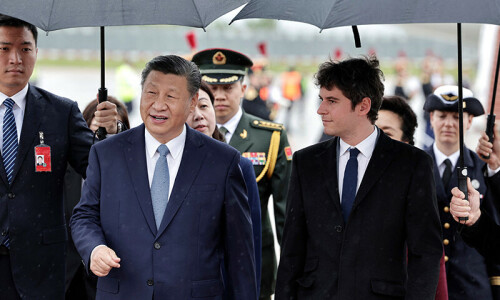UNITED NATIONS: A divided UN Security Council has ended the travel ban exemptions for 13 Taliban officials after failing to reach an agreement on a possible extension.
But the committee will meet again on Monday to reconsider the exemptions that expired at midnight on Friday.
Under a 2011 UN Security Council resolution, 135 Taliban officials are facing sanctions, including asset freezes and travel bans. Of these, 13 were granted exemptions in 2019 on the request of the Trump administration.
This was a Taliban precondition for a peace deal with the United States. The deal, known as the Doha agreement, was signed in February 2020 and ultimately led to the withdrawal of US troops from Afghanistan in August 2021.
Fresh US proposal suggests limiting number of exempted Taliban leaders from 13 to six; Russia and China seek time to consider
During the Security Council’s Friday evening session, Russia and China demanded allowing all 13 Taliban leaders to continue to travel. The US and western nations sought to reduce the number to protest Taliban’s continued denial of basic human rights to Afghan citizens, particularly women.
The United States, which eliminated Al Qaeda leader Ayman al Zawahiri in Kabul in a drone strike two weeks ago, is also concerned about the reemergence of militancy in Afghanistan under the Taliban.
Russia and China asked for more time to consider the US proposal. Since the council members could not reach an agreement, the ban on all 13 Taliban officials was restored until Monday afternoon, when Russia and China must respond to the US proposal.
In June, the Security Council’s sanctions monitoring committee banned two Taliban officials — Said Ahmad Shadikhel and Abdul Baqi Basir Awal Shah — from travelling in response to their crackdown on women. Shadikhel is the acting deputy education minister while Shah is the acting minister of higher education.
The US proposal, submitted on Thursday, suggested imposing the travel ban on seven of the 13 Taliban leaders and keeping the exemption for six others, limiting their travel only to Qatar, where US-Taliban talks have taken place.
Russia and China made a counter-proposal that all 13 Taliban officials be granted travel exemptions for 90 days, but only to go to Russia, China, Qatar and other “regional countries,” such as Pakistan.
Russia and China objected to the US proposal while Britain, France and Ireland opposed the Russia-China proposal, insisting that the exemption can’t continue for all 13 officials.
On Friday afternoon, the US revised its proposal, agreeing to a confined travel ban to seven of the Taliban officials and to keep the travel waivers for six others for 90 days, with no geographic limits.
Russia and China agreed to consider the revised proposal and submit their response on Monday.
In 2019, at the behest of Trump administration, the Security Council first waived the long-standing travel ban imposed on 41 Taliban officials. This allowed 15 leaders to travel for “peace and stability discussions”.
In return, the Taliban guaranteed not to attack US and Nato personnel during the withdrawal.
In September 2021, shortly after the Taliban took control of Afghanistan, the Biden administration requested the first extension to the waiver, allowing the 13 Taliban officials to continue to travel.
In June this year, major human rights groups urged the UN to end the Trump-era waiver as it allowed those Taliban leaders who were responsible for the oppression of women in Afghanistan to travel abroad.
Published in Dawn, August 21st, 2022
















































Dear visitor, the comments section is undergoing an overhaul and will return soon.